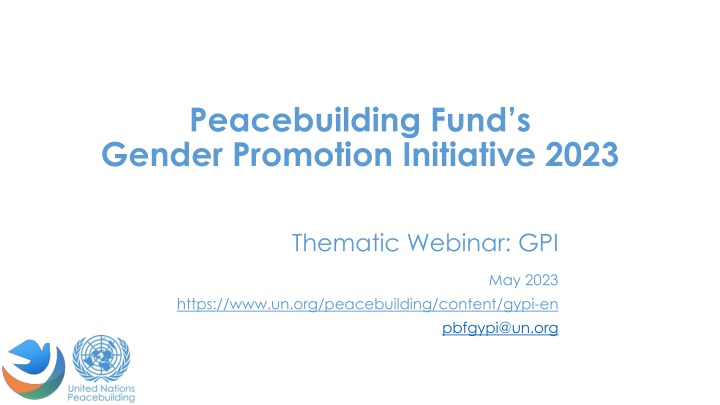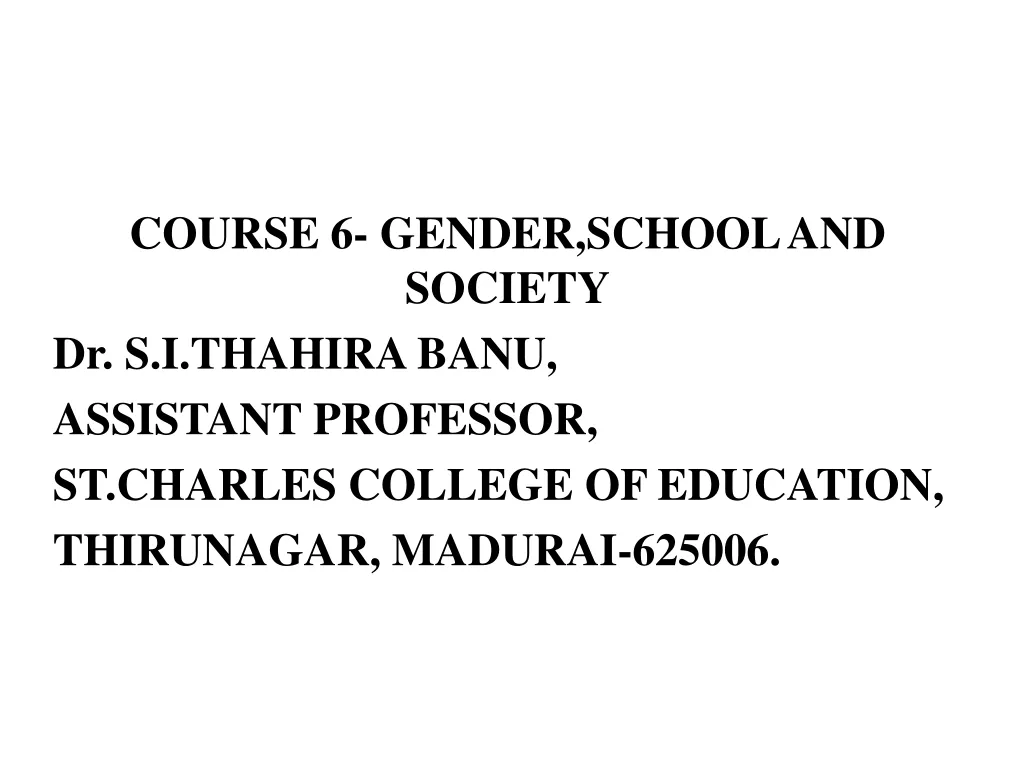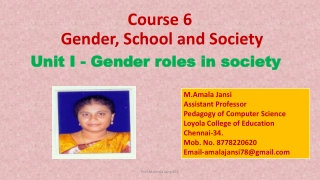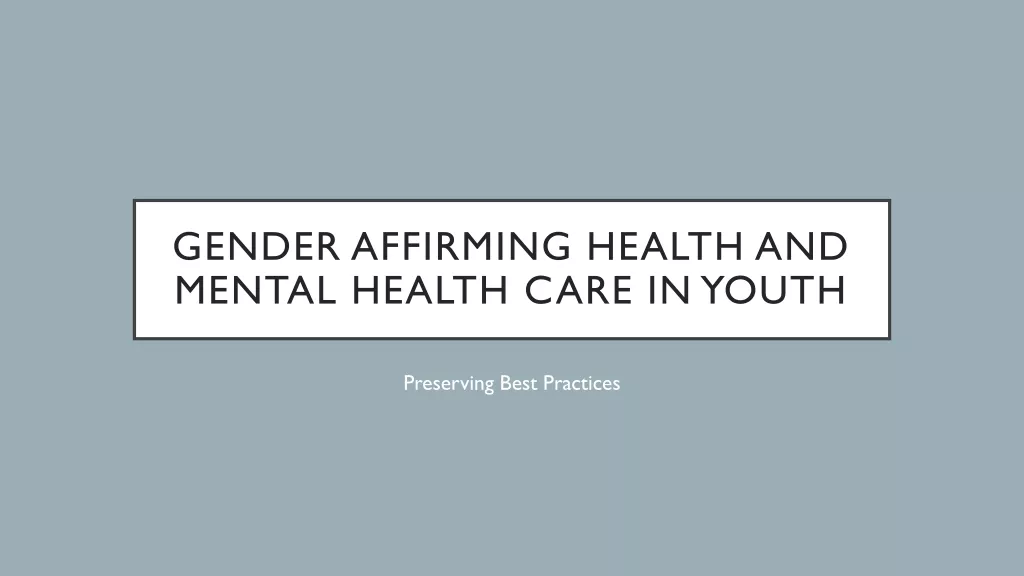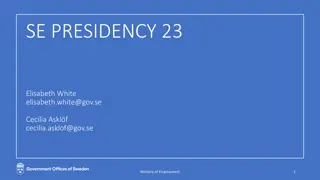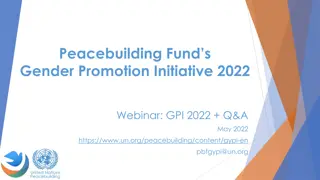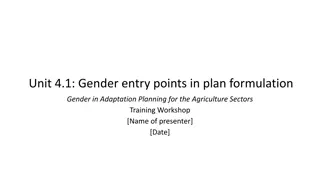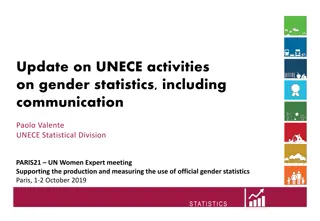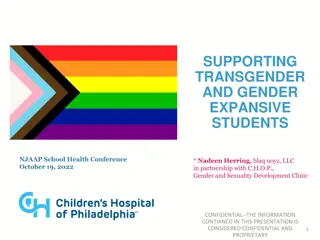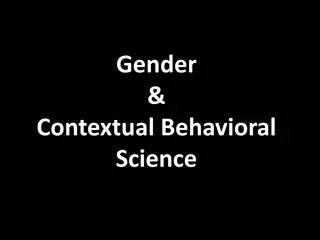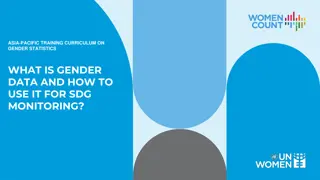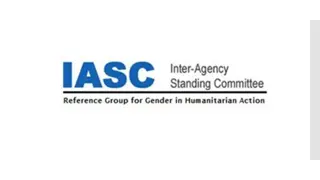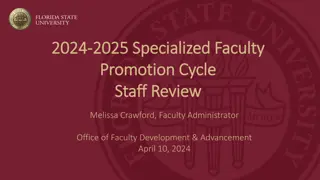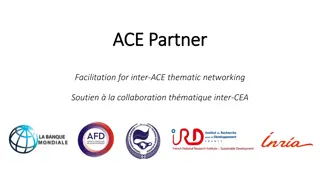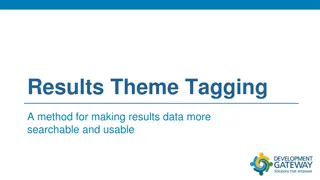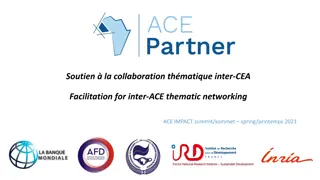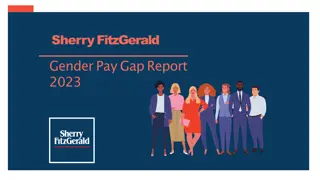Gender Promotion Initiative 2023 Thematic Webinar
Gender Promotion Initiative (GPI) aims to promote gender equality and women's empowerment through peacebuilding projects supported by the UN Peacebuilding Fund (PBF). Since its launch in 2011, the GPI has invested $137 million in 109 projects across 30+ countries, exceeding the UN's 15% target for gender equality allocations. The initiative requires proposals to be gender- and age-sensitive, with a focus on enhancing women's engagement in various sectors. Eligibility criteria specify the types of proposals and timeline for submissions, emphasizing partnerships with national/local women-led organizations. UN Agencies, Funds, Programmes, and Civil Society Organizations are eligible to apply, with specific funding criteria for each category. The call for proposals and concept notes submission deadline is detailed in the overview.
Download Presentation

Please find below an Image/Link to download the presentation.
The content on the website is provided AS IS for your information and personal use only. It may not be sold, licensed, or shared on other websites without obtaining consent from the author.If you encounter any issues during the download, it is possible that the publisher has removed the file from their server.
You are allowed to download the files provided on this website for personal or commercial use, subject to the condition that they are used lawfully. All files are the property of their respective owners.
The content on the website is provided AS IS for your information and personal use only. It may not be sold, licensed, or shared on other websites without obtaining consent from the author.
E N D
Presentation Transcript
Peacebuilding Funds Gender Promotion Initiative 2023 Thematic Webinar: GPI May 2023 https://www.un.org/peacebuilding/content/gypi-en pbfgypi@un.org
Overview Gender Promotion Initiative (GPI) Eligibility Criteria GPI 2023 Themes: Theme 1: Climate Change Mitigation and Adaptation Theme 2: Women s Engagement in Natural Resources Management Good Practices & Lessons Learned Resources Q&A
Gender Promotion Initiative (GPI) In 2011, the UN Peacebuilding Fund (PBF) launched the GPI to allocate peacebuilding projects promoting gender equality and women's empowerment. GPI supports UN Security Council Resolution 1325 and related resolutions. GPI invested $137 million in 109 projects across 30+ countries so far, of which $23 million was invested in 2022. GPI aims to meet the UN's 15% target for peacebuilding allocations focused on gender equality and women's empowerment. PBF exceeded the target for seven consecutive years, reaching 47% across its portfolio in 2022.
Eligibility Criteria The call for proposals contains a detailed list of review criteria and the timeline, available here. Three types of proposals: 1) joint UN proposals, 2) joint UN-CSO proposals, and 3) CSO proposals. Required to be both gender- and age sensitive. Gender marker 3 is crucial for GPI proposals, and at least 40% of the requested budget is to be allocated to national/local CSOs as implementing partners, in particular women-led organizations. Timeline: concept notes due by Friday, June 9th through the website.
Who can apply? UN Agencies, Funds and Programmes (AFPs) and Civil Society Organizations (CSOs) UN Submissions Max two proposals per initiative per UNCT (2 YPI and 2 GPI) All UNCT and UN-CSO submissions must be endorsed by the RC (submission of signed cover letter) 1. Joint UN proposals Grants between $800,000 and $2 million per project 2-3 UN partners as direct fund recipients per project 2. Joint UN-CSO proposals Grants between $800,000 and $2 million per project Max 2 UN partners and 1 CSO partner as direct fund recipients per project CSO partners need to meet the eligibility criteria
Who can apply? CSO Submissions Maximum two proposals per initiative per organization globally (2 YPI and 2 GPI) Grants between $300,000 and $2 million per project Max one CSO as direct fund recipient per project and need to meet CSO eligibility criteria Concept notes can be submitted by the CSO independently, and in the final approval stage of full project proposals RC/DSRSG/SRSG and government approval are required All CSO applicants are recommended to reach out to the PBF Secretariat/Focal Points in the project country
CSO Eligibility Criteria Formally registered as non-profit, for the duration of the proposed project in 1) the country where the headquarters is located and 2) the project country. Required to receive a low-risk score in a HACT micro-assessment in the project country. The questionnaire such an assessment is based on can be found here for reference. If already assessed, low-risk scores from Jan 2022 and onwards will be accepted. If not yet assessed, for organizations invited to the second stage PBF will commission micro-assessments UN reference or donor reference from the project country, attesting to satisfactory financial and programmatic management of a grant in the last three years. In the second stage: CSOs will be reviewed regarding prevention of sexual exploitation and abuse (PSEA)
Gender Marker 3 Gender Marker 3 The principal purpose of the project is to advance gender equality and women s empowerment (GEWE) in the context of peacebuilding. Gender equality is fundamental to the project design and the expected results. 80-100% of the total budget is allocated to GEWE. The PBF Gender Marker Guidance contains more information, available here.
Lessons learned Main reasons for concept notes not being selected in the past: 1. Link to peacebuilding: Successful proposals were able to clearly articulate the link between the proposed interventions and the intended peacebuilding outcome 1. Gender / youth responsiveness: Successful concept notes placed this at the center of their proposal 2. Innovation: Successful concept notes articulated how and why their proposal was innovative Please find the review criteria listed in the Call for Proposal.
Thematic Focus GPI The GPI call for proposals for 2023 focuses on: Climate change mitigation and adaptation Women's engagement in natural resources management 1. 2. The call addresses challenges and gaps identified in the 2022 Secretary-General's Report on WPS and the 2023 PBSO's Thematic Review on Climate Security and Peacebuilding. Climate, peace and security refers to the ways in which climate change may exacerbate or compound risks of violence, conflict, and other personal or national vulnerabilities and threats . Gender equality and power dynamics are critical to understanding the disproportionate impacts of climate change on women and marginalized communities, and to building resilient, inclusive, and sustainable societies.
Theme 1: Climate Change Mitigation and Adaptation Climate change mitigation refers to efforts that reduce or prevent greenhouse gas emissions Climate change adaptation refers to changes in practices, systems, or behaviors to moderate potential damages or benefit from opportunities associated with climate change Women have unique experience and knowledge of natural resources that are critical in designing and implementing effective adaptation strategies. Women face obstacles to participating in decision-making and planning processes, which can further marginalize them and undermine opportunities for holistic strategies. Promoting innovative climate-security projects that support women's roles in climate change mitigation and adaptation, address their specific risks, and account for their interaction with factors contributing to conflict is crucial.
Theme 2: Womens Engagement in Natural Resources Management Women's gendered roles as primary natural resource managers mean they are highly dependent on natural resources for their livelihoods and uniquely positioned to contribute to decision-making and conflict resolution efforts around these issues. Women's participation in decision-making related to natural resource governance can address power imbalances and promote inclusive governancefor more peaceful societies. Ensuring women's access to and control over natural resources can enhance their social and economic empowerment and contribute to more peaceful and just societies by reducing gender-based inequalities and addressing root causes of conflict.
Project examples Climate change adaptation: The Gambia (PBF/GMB/B-2): promotes social cohesion and resilience by empowering communities to develop effective coping mechanisms for managing climate-related risks, building sustainable livelihoods, and reducing gender-related vulnerabilities through gender-sensitive approaches for conflict prevention and climate resilience. Climate change mitigation: Burundi (PBF/BDI/C-1): promotes conservation in Kibira National Park and sustainable peace by supporting the government in deploying Eco-guards and implementing a Reducing Emissions from Deforestation and Forest Degradation (REDD+) strategy that aims at reducing drivers of deforestation, accessing carbon markets, and providing alternative livelihood models that bring co-benefits to local communities. Natural Resource Management: South Sudan (PBF/IRF-257): promotes women's economic empowerment by providing training and capacity building for women's groups on sustainable agricultural practices. The project also aimed to improve women's access to natural resources and their participation in natural resource management committees.
GOOD PRACTICES & LESSONS LEARNED (1) Progress made in understanding and addressing gendered risks and opportunities for inclusion in climate security practice. Recognition for the integration of gender-responsive approaches as essential for sustainable, equitable, and effective peacebuilding outcomes. Lessons learned around conducting integrated analysis and assessments, strengthening local partnerships, and promoting capacity strengthening: Conducting integrated analysis and assessments is critical to inform the design and implementation of targeted interventions. Strengthening partnerships with civil society organizations, women's groups, and local communities increases effectiveness and sustainability. Capacity strengthening for local actors, particularly women and marginalized groups, enhances participation and leadership.
GOOD PRACTICES & LESSONS LEARNED (2) Other key lessons learned: Careful project design, with women leading in identifying priorities, improves integration. Intersectional analysis of natural resource use access and control can address intersecting forms of discrimination. Strategic sequencing of project activities helps achieve better outcomes. Incorporating gender-responsive indicators and M&E frameworks ensures achieving intended outcomes and contributing to gender equality.
Resources Gender and Youth Promotion Initiative: dedicated website providing information on GYPI's objectives, focus areas, and supported projects. - Thematic Review on Climate Security and Peacebuilding: provides lessons learned on integrating gender-responsive approaches in climate and environmental programming. Link: - Joint Report on Gender, Climate and Security: Sustaining inclusive peace on the frontlines of climate change: explores gender dimensions of climate change and security risks and provides case studies and examples of gender-responsive approaches. - E-learning course on Climate Change, Peace and Security: Understanding Climate-Related Security Risks Through an Integrated Lens: covers the role of gender in addressing climate-related security risks. - Knowledge Platform on Gender and Natural Resource Management in Peacebuilding: provides resources and information on integrating gender in natural resource management for peacebuilding. - Trello Page on Gender, Climate and Security: hosted by UN Women, compiling a range of publications, toolkits, case studies, and podcasts. - Beyond Consultations Initiative: practical guidance and tools to support the design and implementation of inclusive processes. -
